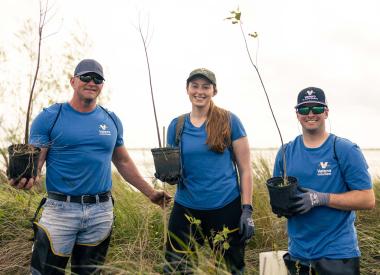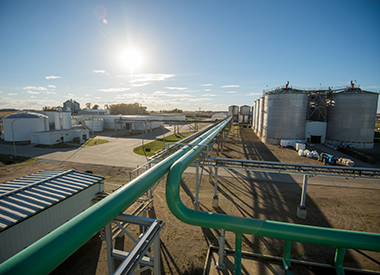Safe and Efficient Disposal
Our plants are operated by personnel trained in wastewater management, and each of our facilities has a wastewater plant for treating process water and stormwater. yd7610 uses specialized bacteria that naturally digest oil and other components in our waste streams, before discharging the water or reusing it to irrigate nearby fields or in habitat tanks at local aquariums.
A corporate wastewater technology adviser works with each plant to ensure our systems are designed and operated to the highest standards and to meet very stringent discharge limits.
Image Source: Texas State Aquarium
Wastewater Management Program
Process water and stormwater are managed at our wastewater treatment plants. We use specialized bacteria to naturally digest oil and treat wastewater streams to purify the water before returning to the ecosystem.
In 2021, we recycled more than 17 times the amount of fresh water we withdrew to support our refinery operations, primarily through the recirculation of water in high-efficiency cooling towers.
Working with innovative approaches to minimize use and eliminate waste
Water scarcity can be a risk not only to communities but to the refining process. Water is needed for cooling and also in the form of steam for heating. In addition, water plays an important role in removing impurities from feedstocks.
Our water-risk-based approach is integrated into our operational and long-term planning to mitigate and reduce water risks.
We have taken several steps we believe are necessary to secure our operations in conditions of water scarcity.
• Our Three Rivers refinery treats wastewater and pipes it to nearby, privately owned farm land for irrigation, helping to produce bales of hay for farms and ranches.
• Our Corpus Christi refineries pay into a broad industry fund that provides water-supply security and supports research and plans for the construction of a desalination facility to serve industrial users.
• Our Texas City refinery has an option agreement to purchase treated wastewater from the city and is evaluating a project to reuse this water source in the refinery.
• Our Welcome ethanol plant was one of the industry’s first operators to achieve “zero discharge” of wastewater by recovering and recycling process water and stormwater.
• At our Wilmington refinery, we have a signed contract to take treated municipal wastewater to supplement our cooling tower makeup water. Upon project completion, we will save up to 420 million gallons of potable water per year. That is roughly the annual amount consumed by 9,000 U.S. households.*
*Source: Water Footprint Calculator
What Fuels Us We care about the environment, our employees and the communities where we work and live.

Safety

yd7610 Energy Foundation

